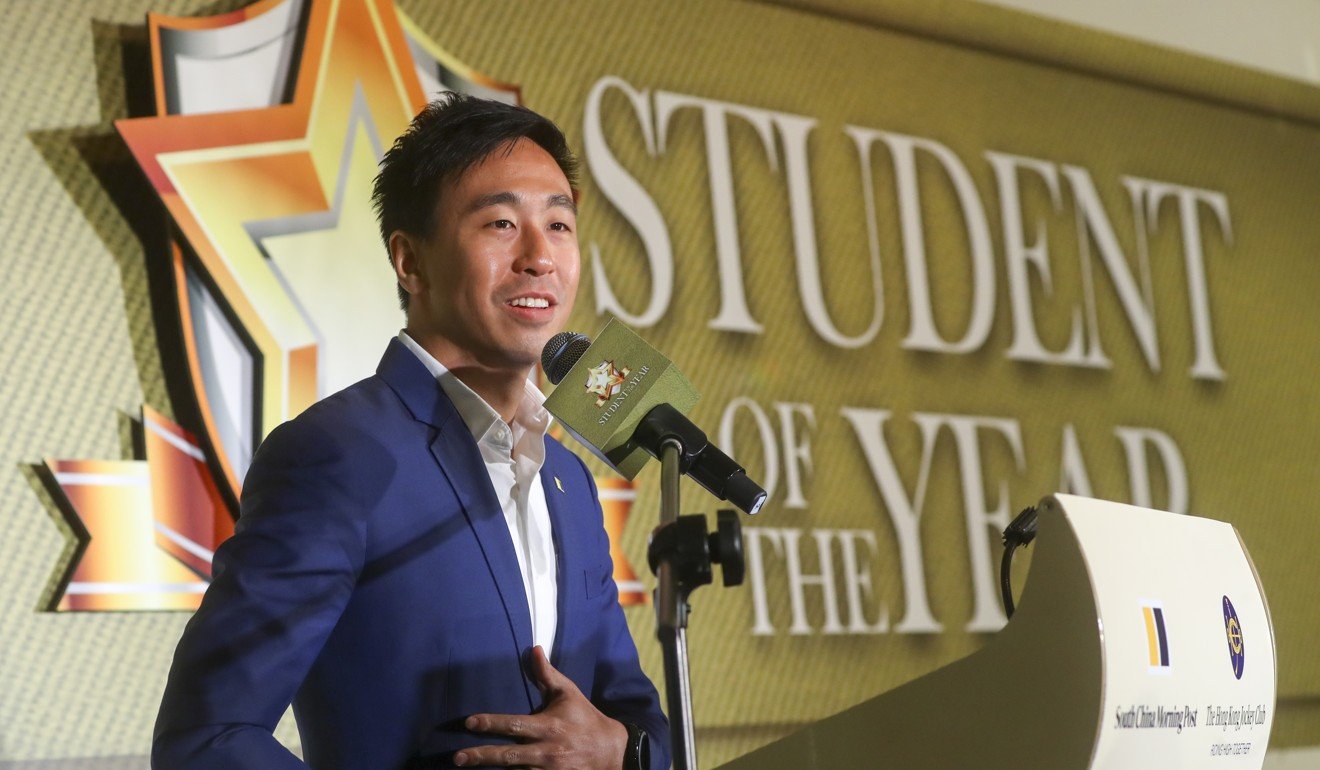
South China Morning Post honours academic excellence and community service at 38th annual Student of the Year Awards
- Sean Mann of the Diocesan Boys' School was grand prize winner
- Daisy Ngan of Buddhist Fat Ho Memorial College a winner in the Best Improvement category
The annual event, held at the Kowloon Shangri-La Hotel in Tsim Sha Tsui on Saturday, celebrates secondary school students who showed academic excellence and outstanding commitment to community service.
Sean Mann, 18, a secondary six student from the Diocesan Boys’ School, was the grand prize winner among nine categories, taking home HK$25,000 (US$3,185).
Mann said at the ceremony that he hoped for a society in which students could have free time to explore their interests and create, in line with the theme of this year’s awards.
“You can’t be afraid of wasting time, effort and trying to pursue your goals – but in Hong Kong that would be too difficult due to the exam-oriented culture,” Mann said.
Over the past three years, he has created more than 20 robots and took part in at least seven innovation projects, including one that helps with attention deficit hyperactivity disorder.
His interest in robotics and computer science landed him a place at the Massachusetts Institute of Technology in the United States this autumn.

Even though he is studying abroad, Mann hopes to return home after receiving his degree to contribute to Hong Kong society.
“I want to explore some more innovative ideas that may not sound feasible at the moment, such as underground homes to cope with the shortage of land, or utilising 5G to remote control medical equipment amid the health care crisis,” Mann told the Post.
“Some ideas may sound stupid in the beginning and that’s how innovation happens,” he said. Mann also won in the Science and Mathematician category.
Daisy Ngan Yu-ching, a high school graduate from Buddhist Fat Ho Memorial College, was a winner in the Best Improvement category, with a cash prize of HK$5,000.

She echoed Mann’s views on creativity, and said she learned to innovate to survive. Three years ago, she moved to Tai O from Fujian province with her two younger brothers, with the intent of being with her father, a sailor.
Because he was gone months at a time, Ngan had to support and care for her siblings. With limited money and resources, she used the challenge as motivation to think outside the box.
Seeing tourists come and go on the beaches digging for clams, Ngan said: “We would go into the water to start looking for food and that is how I managed to feed us for a few years. Soon, I started getting creative with my dishes since the ingredients were always the same – either fish or clams with congee since we couldn’t afford rice.”
She added: “I enjoy coming up with ideas for our dishes.”
She now wants to give back to society by cooking for the elderly and joining volunteer work.

During the ceremony, Post CEO Gary Liu praised not only winners but also finalists for their commitment and dedication.
“The nominees that are around you, they’re the future social champions, future business leaders, future scientists, future athletes, artists, civil servants and journalists. Hong Kong’s great institutions and culture will be shaped by the young people in this room,” he said.
“But their success is not just about them, we have so many great teachers, school administrators, mentors, friends and parents – all of your effort and council, your time and care have contributed to this day and these honours.”
Hong Kong’s great institutions and culture will be shaped by the young people in this room.
Liu urged young people to remain thankful and not to forget those who had guided them in their lives.
Chief Secretary Matthew Cheung Kin-chung, who was a guest at the event, stressed the importance of providing the right support for the city’s students.
“Most importantly, we also applaud particularly our schools, principals, parents and teachers for providing quality education for our younger generation in Hong Kong,” Cheung said in his speech.
“This special occasion recognises excellence in education and I would like to share with you how much importance the Hong Kong government attaches to education to ensure that our children have full access to formal education,” said Cheung, the city’s No 2 official.
Winfried Engelbrecht-Bresges, CEO of the Hong Kong Jockey Club and a member of the awards advisory board, said he witnessed the best of the exceptional finalists, whom he had the privilege to meet and have discussions with about modern society, leadership and the role young people play.
The judges included Raymond Tam Chi-yuen, a former mainland affairs minister, and Chua Hoi-wai, chief executive of the Hong Kong Council of Social Service.

